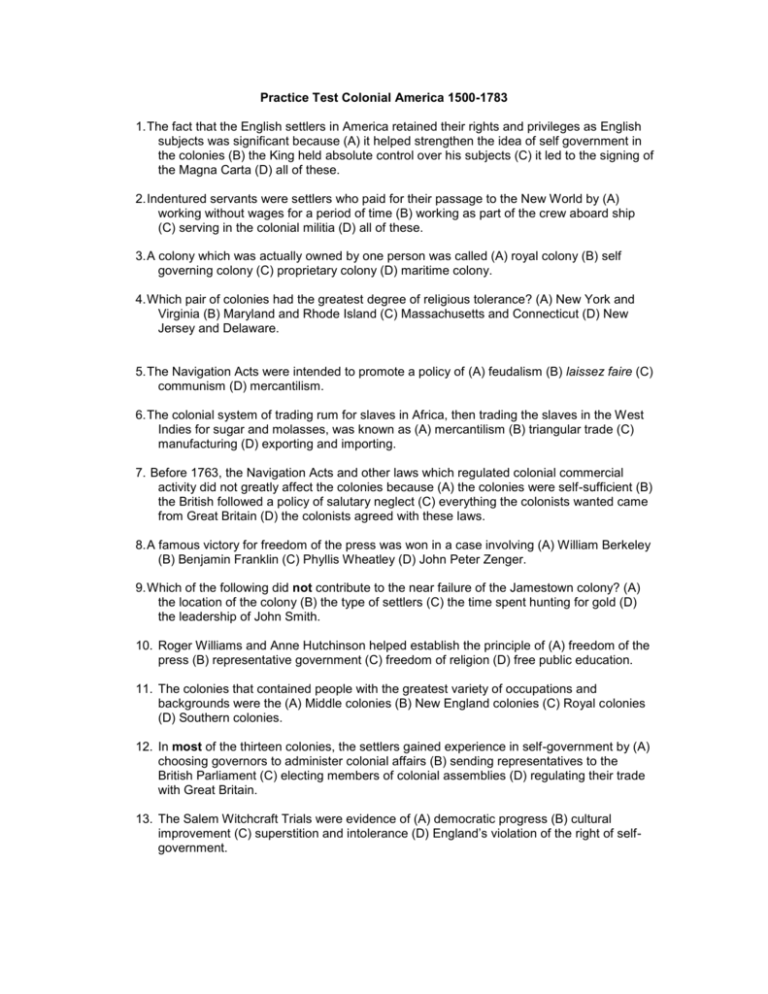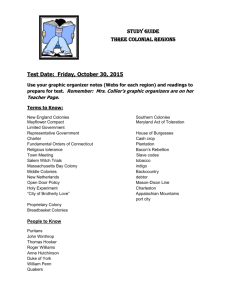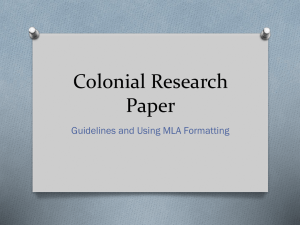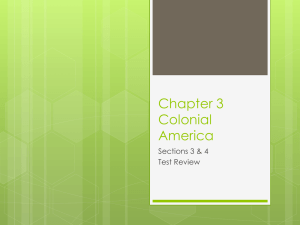Revolution
advertisement

Practice Test Colonial America 1500-1783 1. The fact that the English settlers in America retained their rights and privileges as English subjects was significant because (A) it helped strengthen the idea of self government in the colonies (B) the King held absolute control over his subjects (C) it led to the signing of the Magna Carta (D) all of these. 2. Indentured servants were settlers who paid for their passage to the New World by (A) working without wages for a period of time (B) working as part of the crew aboard ship (C) serving in the colonial militia (D) all of these. 3. A colony which was actually owned by one person was called (A) royal colony (B) self governing colony (C) proprietary colony (D) maritime colony. 4. Which pair of colonies had the greatest degree of religious tolerance? (A) New York and Virginia (B) Maryland and Rhode Island (C) Massachusetts and Connecticut (D) New Jersey and Delaware. 5. The Navigation Acts were intended to promote a policy of (A) feudalism (B) laissez faire (C) communism (D) mercantilism. 6. The colonial system of trading rum for slaves in Africa, then trading the slaves in the West Indies for sugar and molasses, was known as (A) mercantilism (B) triangular trade (C) manufacturing (D) exporting and importing. 7. Before 1763, the Navigation Acts and other laws which regulated colonial commercial activity did not greatly affect the colonies because (A) the colonies were self-sufficient (B) the British followed a policy of salutary neglect (C) everything the colonists wanted came from Great Britain (D) the colonists agreed with these laws. 8. A famous victory for freedom of the press was won in a case involving (A) William Berkeley (B) Benjamin Franklin (C) Phyllis Wheatley (D) John Peter Zenger. 9. Which of the following did not contribute to the near failure of the Jamestown colony? (A) the location of the colony (B) the type of settlers (C) the time spent hunting for gold (D) the leadership of John Smith. 10. Roger Williams and Anne Hutchinson helped establish the principle of (A) freedom of the press (B) representative government (C) freedom of religion (D) free public education. 11. The colonies that contained people with the greatest variety of occupations and backgrounds were the (A) Middle colonies (B) New England colonies (C) Royal colonies (D) Southern colonies. 12. In most of the thirteen colonies, the settlers gained experience in self-government by (A) choosing governors to administer colonial affairs (B) sending representatives to the British Parliament (C) electing members of colonial assemblies (D) regulating their trade with Great Britain. 13. The Salem Witchcraft Trials were evidence of (A) democratic progress (B) cultural improvement (C) superstition and intolerance (D) England’s violation of the right of selfgovernment. 14. The “Great Awakening” of the 18th century was (A) an intellectual and philosophical movement in America similar to the Enlightenment of Europe (B) the process by which Americans started to see the advantages of independence from Great Britain (C) the beginning of the first substantial American contribution to the fields of art and literature (D) a major religious revival. 15. Which of the following was not one of the colonial South’s cash crops? (A) indigo (B) rice (C) sorghum (D) tobacco 16. During the first half of the 18th Century, colonial assemblies frequently used “the power of the purse” to (A) check royal governors (B) encourage political union among the colonies (C) obtain money from England (D) extend suffrage in the frontier settlements. Answers 1. 2. 3. 4. 5. 6. 7. 8. 9. 10. 11. 12. 13. 14. 15. 16. A A C B D B B D D C A C C D C A








